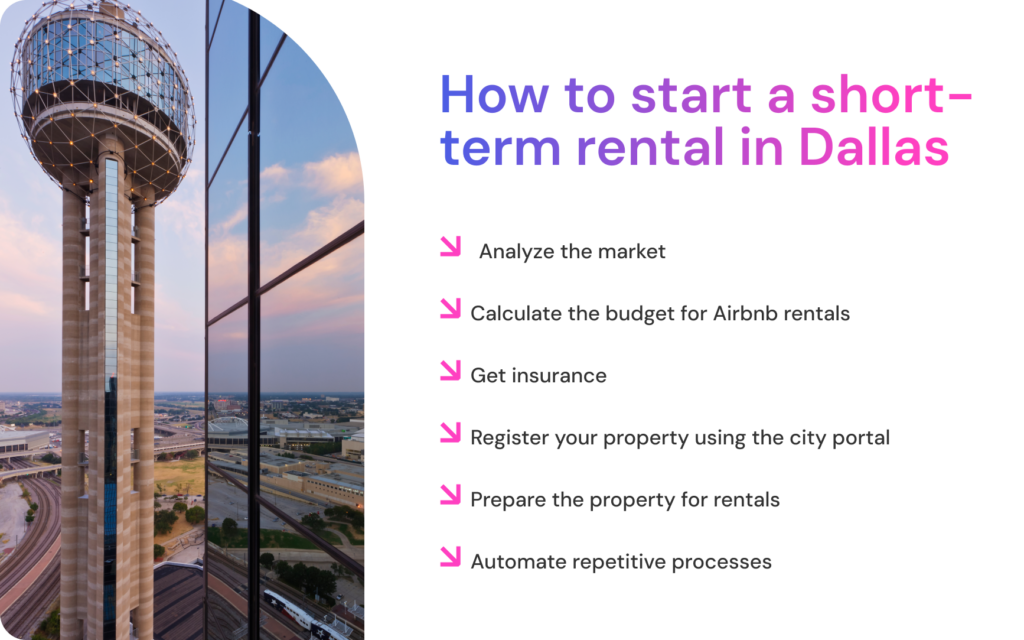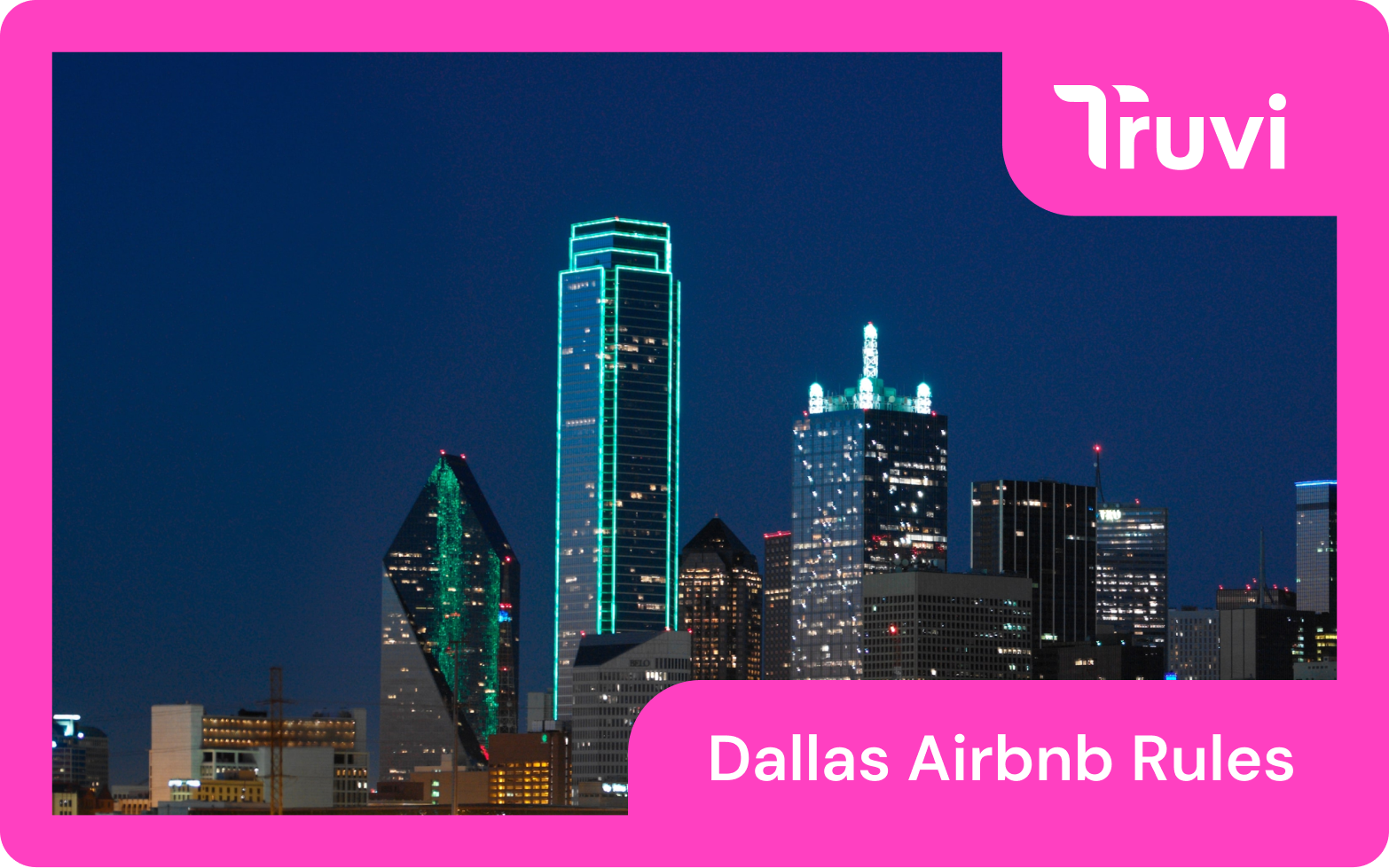Dallas, TX, is one of the US cities bound by STR regulations. You cannot rent property on Airbnb without getting a specialized permit and following many other rules. The case is not unique. Laws regulating Airbnb are a common way to manage housing prices and protect neighborhoods from the oversaturation of short-term rentals.
Regardless of the partial Dallas short-term rental ban, you can have a rental business here. The city has high demand due to the active business life and a regular flow of tourists. With over 10k listings available, according to AirDNA, the STR market is thriving.
Learn more about Dallas short-term rental regulations, zoning restrictions, and steps to start Airbnb rentals lawfully in our post.
Is Airbnb banned in Dallas?
If you want a quick answer about Airbnb being banned in Dallas — No, Dallas does not ban Airbnb and other short-term rental platforms. You are allowed to rent property short-term (up to 30 days).
The city attempted to regulate short-term rentals and implement zoning with a series of ordinances. However, they faced a temporary injunction. Besides these ordinances, the city still imposes minimum property standards, registration procedure, property inspections, and noise requirements.
Dallas short-term rental ban of 2023
In June 2023, the City Council passed new Dallas STR regulations, voting for two ordinances limiting short-term rentals. They aimed to prohibit STR in single-family residential zones but got stuck in legal battles.
A Dallas County judge put the Dallas short-term rental ban on hold after the alliance of rental operators sued the city. That’s why only minor restrictions apply so far, making Dallas a city with relatively lenient regulations.
The current state of Dallas short-term rental regulations
The ordinances enacted in June 2023 to limit the districts where Airbnb rentals are allowed are still on hold. The recent higher court decision upholds the temporary injunction by the Dallas District Court judge seeing the proposed limitations as an injury to property rights owners.
Here’s what the City of Dallas website says about short-term rentals:
“On December 6, 2023, a temporary injunction was filed prohibiting the enforcement of the two short-term rental ordinances. In the meantime, the City will continue enforcement of its existing ordinances governing minimum property standards, disturbing noises, and private nuisances.”
So, you may put your Dallas Airbnb ban map aside and keep short-term rentals in single-family neighborhoods for some time. Just make sure to monitor the changes in the Dallas short-term rental ban and be ready to adapt to stricter requirements.
Main requirements of the Dallas Airbnb laws

Let’s go through the key points of the Dallas short-term rental regulations. Some are in force despite the temporary injunction on the STR ordinances, while others are likely to remain on hold for some time or get modified.
Registration and licensing
Airbnb owners must register their properties using the MUNIRevs portal by the city of Dallas. You will need to create a profile and provide your tax account number, rental address, and business information. The form takes some time to complete, but it’s the necessary step to comply with city regulations and get an STR license. Once done, you must add this license number to your property listing.
Operating a short-term rental without a permit can result in up to $500 fine per violation.
Occupancy and parking
According to the Dallas short-term rental regulations, you cannot host more than 12 guests per rental unit with up to three people per bedroom. The minimum night stay is two nights. You must also provide one off-street parking space per bedroom. It guarantees more comfort for guests and prevents residential areas from being overcrowded.
Property inspections
According to Dallas Airbnb laws, mandatory inspections are part of the property registration process. You will need to invite inspectors when applying for an STR license so they can check whether the property meets safety and housing standards. If you fail the first time, you must make the necessary changes at your place and request a re-inspection for an additional fee.
Noise restrictions
Dallas Airbnb laws include the city’s noise ordinance limiting the hours for loud activities. You or anyone living in your property mustn’t make noise audible from neighboring properties between 10 pm and 7 am. It’s a common demand that protects people in multi-story buildings from disturbances.
You should inform guests about these limitations in your property policy and try to prevent unsolicited parties at your place. Careful guest screening is one of the ways to do it. Get Truvi for automated safety guest checks to detect people with a bad reputation before they end up in your property and throw a party.
Zoning restrictions in Dallas
Zoning restrictions is what caused the most heated arguments regarding the 2023 STR ordinances. They ban Airbnb rentals in single-family residential areas, allowing them only in multi-family, commercial, and mixed-use city zones. The impact would be huge since up to 90% of Dallas STR rentals are in single-family residential areas. This initiative resulted in a lawsuit aiming to protect the rights of homeowners. As a result, the ordinance was put on hold on December 6, 2023.
Nevertheless, you must be aware of the zoning restrictions before starting rentals in Dallas. This part of the Dallas short-term rental ban is on pause but may be enacted in a different format soon. Be ready for the changes and follow updates.
Dallas short-term rental taxes
Airbnb hosts must collect the hotel occupancy tax (HOT) and pay it to the city monthly. In Dallas, you pay 7% of the rental rates, excluding the cost of food and personal services not related to preparing the place for the guest.
You must also submit a HOT report every month according to Dallas Airbnb laws, even if you don’t have guests. The hotel occupancy tax and reports are due by the 15th day of the month after the month when you collected payments. It means the taxes for collections in June must be paid by the middle of July. If you submit everything on time, you are eligible for a 1% discount on taxes due. If you are 11 to 30 days late, a 15% penalty applies in addition to all taxes due.
Does Dallas strictly monitor compliance?
So far, the city monitors compliance with noise and property standards. As long as the injunction on the STR ordinances stays in force, authorities cannot prevent you from renting property in single-family residential areas. However, the city is the main supporter of the Dallas short-term rental ban and keeps pushing for its implementation. Chances are short-term rentals will face stricter limitations soon.
Overall, the city’s authorities are focused on protecting residents and neighborhoods rather than the STR industry growth. If the 2023 ordinances come into full force, you may be unable to have Airbnb in single-family residential areas. Be ready for that.
How to start a short-term rental in Dallas

Do you have a property in Dallas and want to post it on Airbnb? Or maybe considering this city for investment? These are steps to start an STR business by law and make it profitable.
Analyze the market
Gather data on the Airbnb market in Dallas and get acquainted with the Dallas short-term rental regulations. You can use resources like AirDNA to check the average number of nights, daily rates, approximate annual revenue, and other details. This information should help you estimate whether Dallas is a good option for short-term rentals and form the right expectations.
Do some math
Calculate the budget you need to prepare the property for Airbnb rentals. People expect full Airbnb amenities like towels, linen, basic toiletries, an equipped kitchen, a washing machine, and other details, resulting in significant costs.
Then, estimate regular expenses involved in Airbnb maintenance such as cleaning fees and fixing property damage. Add up all the costs and potential income to calculate ROI and make sure short-term rentals are profitable before launching anything. You may decide to choose another property at this point or change your pricing strategy.
Get insurance
Even though the city doesn’t require owners to provide insurance for registration, it’s a powerful way to protect your property and avoid financial losses. Choose an insurance suitable for short-term rentals. Truvi offers three plans for damage protection services with different terms and coverage.
You can also use damage deposits or waivers to additionally protect your property from guest damage that is very common in Airbnb rentals.
Register your property using the city portal
Go to the MUNIRevs portal by the city of Dallas and register your property. You must provide your personal information and property details, connect the property to your account, and fill out the tax registration form. Find video instructions on how to complete the registration. Once the city reviews your application, you will receive confirmation by email.
Prepare the property for rentals
Make sure your property looks cozy and clean. Stock the essential amenities. Take photos featuring the bedroom(s), kitchen, bathroom, and nice details that will make your listing stand out from tons of others. The photos must be nice but realistic. Don’t make it expectations vs. reality.
Check multiple listings to see what hosts write there and create a compelling description for yourself. It should describe the place, including the rules and amenities. You can find more information on preparing your place for Airbnb in our article.
Automate repetitive processes
To make short-term rentals truly efficient, you must minimize your involvement in things like cleaning, meeting guests, standard communications, guest screening, accounting, etc. Try to automate or delegate everything that happens whenever someone books your property.
Fortunately, there are many tools you can use for that. It will save you time and allow you to focus on more important tasks like scaling your STR business or enjoying life.
What about STR regulations in other US cities?
The housing crisis and the acute shortage of properties available for long-term rent make many US cities limit Airbnb. Large touristic hubs and popular locations have particularly strict limitations. They often demand hosts to live in the rental property, among other restrictions.
We have created a series of guides on STR regulations for hosts. Check them out to learn more about Airbnb bans across top locations.
- Denver Airbnb rules
- Las Vegas Airbnb laws
- San Diego short-term rentals law
- San Francisco Airbnb laws
- Los Angeles Airbnb laws
- New York Airbnb ban
- Atlanta Airbnb rules
- Chicago Airbnb rules
- Miami Airbnb laws
- Seattle Short-Term Rental Laws
The Dallas short-term rental ban is definitely not the strictest STR regulation in the US and globally despite causing many limitations. Besides, as long as it’s on hold, many restrictions don’t apply. It makes Dallas an attractive option for Airbnb rentals if you are ready to stay flexible and accept the fact that the rules may change.
Conclusion
Dallas short-term rental regulations are still in progress and may become stricter soon. The city will keep pushing zoning restrictions banning Airbnb in single-family residential areas. Currently, hosts must comply with minimum property standards, minimize disturbing noises, and register their property to pay taxes and get a license.
Overall, Dallas is a good option for a short-term rental business with enough demand and comparatively high rates. Just make sure to follow the rapidly changing rules and consider city zoning before investing in property.
Important Disclaimer: The content of this blog post is for informational purposes only and does not constitute legal advice. We strongly recommend seeking professional legal counsel for any specific legal questions or before making any decisions based on the information provided here. Truvi makes no representations or warranties regarding the accuracy, completeness, or suitability of the information and will not be liable for any loss, damage, or legal consequences arising from its use.







